Nucleic Acid Stability Testing
The integrity and stability of nucleic acids are critical factors in pharmaceutical development. Nucleic acid-based therapeutics such as RNA vaccines, mRNA drugs, and gene therapies require stringent testing to ensure their efficacy and safety over time. Stability testing is essential for determining the shelf life of these products under various environmental conditions.
At Eurolab, we specialize in providing comprehensive stability testing services tailored specifically to nucleic acid-based pharmaceuticals. Our approach ensures that all regulatory requirements are met while offering detailed insights into product performance and potential degradation pathways. This section will delve into the intricacies of nucleic acid stability testing, including its importance within the pharmaceutical industry.
Nucleic acids can degrade through various mechanisms such as hydrolysis, oxidation, or photodegradation. These processes affect not only the chemical structure but also the biological activity of the molecules. Therefore, understanding how these changes occur over time is crucial for predicting drug stability and ensuring consistent quality throughout storage periods.
Stability studies typically involve exposing samples to different temperature, humidity, light exposure levels, and other stressors that simulate real-world conditions during transportation or shelf life. By monitoring key parameters like degradation products, impurities, and overall integrity after exposure to these stresses, we can assess the stability of nucleic acid pharmaceuticals.
Our team follows internationally recognized guidelines such as those provided by ICH Q1A(R2) for chemical stability testing which includes assessing physical characteristics, chemical attributes, biological activity, and impurity levels over time. For nucleic acids, additional considerations must be taken into account due to their unique properties; thus, our protocols incorporate specific methodologies aimed at addressing these challenges.
Testing procedures include but are not limited to accelerated aging studies where samples are exposed to high temperatures or humidity conditions for extended periods, classical stability indicating tests that measure the extent of degradation products formed under normal storage conditions, and long-term stability testing which aims to predict shelf life based on real-world exposure scenarios.
In addition to laboratory-based analyses, we also offer real-time monitoring using state-of-the-art equipment such as high-performance liquid chromatography (HPLC), capillary electrophoresis (CE), mass spectrometry (MS), and other advanced analytical techniques. These methods allow us to detect even minor changes in the nucleic acid structure with precision.
The results from these tests provide invaluable information about the stability profile of a particular drug candidate or marketed product, helping manufacturers make informed decisions regarding formulation modifications, packaging choices, and labeling updates if necessary.
Understanding nucleic acid stability is vital for ensuring that pharmaceutical products remain safe and effective throughout their shelf life. At Eurolab, we employ rigorous testing protocols combined with cutting-edge technology to deliver accurate data on the stability of your nucleic acid-based drugs.
Scope and Methodology
| Parameter | Description |
|---|---|
| Temperature Range | From -20°C to 65°C, depending on the specific requirements of the product being tested. |
| Humidity Levels | Relative humidity ranging from 10% to 90%, controlled within ±5%, to simulate various environmental conditions. |
| Light Exposure | Continuous exposure to UV light at wavelengths between 254 and 365 nm, simulating potential degradation pathways due to sunlight or other sources of radiation. |
| Storage Duration | Durations vary from several months up to two years, depending on the desired shelf life prediction for the product. |
The scope and methodology employed in nucleic acid stability testing at Eurolab encompass a wide range of parameters that can influence the degradation process. By controlling these variables precisely within our controlled environments, we ensure accurate representation of real-world conditions during storage or transportation.
Our methodologies adhere strictly to international standards including ICH Q1A(R2) and other relevant guidelines set forth by regulatory bodies worldwide. This ensures compliance with global pharmaceutical requirements while providing precise data that can be used for product development and approval processes.
Eurolab Advantages
At Eurolab, our commitment to excellence extends beyond just conducting thorough stability tests; we also offer several unique advantages that set us apart from other laboratories in the industry. Our experienced team of scientists and engineers has extensive knowledge and expertise specifically related to nucleic acid-based pharmaceuticals.
- Innovative Approach: We stay at the forefront of scientific advancements, continuously refining our testing methods based on latest research findings.
- Comprehensive Services: From initial formulation development through final approval, we provide end-to-end support for all aspects of nucleic acid stability testing.
- Regulatory Compliance: Our processes are aligned with the highest standards recognized globally, ensuring that your products meet stringent regulatory requirements.
- Precision Instrumentation: Leveraging advanced analytical tools like HPLC, CE, and MS allows us to deliver highly accurate results.
- Expertise: Our multidisciplinary team includes specialists in chemistry, biology, engineering, and medicine who collaborate closely throughout each project lifecycle.
- Rapid Turnaround Times: By optimizing our workflows and utilizing efficient communication channels with clients, we strive to minimize delays without compromising quality.
These advantages collectively contribute to creating a robust foundation for reliable stability data generation which is essential in the development of safe and efficacious nucleic acid-based pharmaceuticals.
International Acceptance and Recognition
- ICH Q1A(R2): Guidelines on chemical stability testing, including recommendations for nucleic acids.
- American Society for Testing Materials (ASTM) E2639-17: Standard practice for conducting accelerated stability studies of pharmaceuticals using temperature humidity and light.
- European Pharmacopoeia (Ph. Eur.): Chapter 5.4 Stability testing, which covers various aspects including physical characteristics, chemical attributes, biological activity, and impurity levels.
- International Organization for Standardization (ISO): ISO 17025: General requirements for the competence of testing and calibration laboratories, ensuring high-quality testing practices.
The international recognition of our stability testing services is underscored by adherence to these widely accepted standards. By aligning ourselves with such reputable organizations, we ensure that the results obtained from nucleic acid stability tests at Eurolab are universally respected and accepted across borders.





